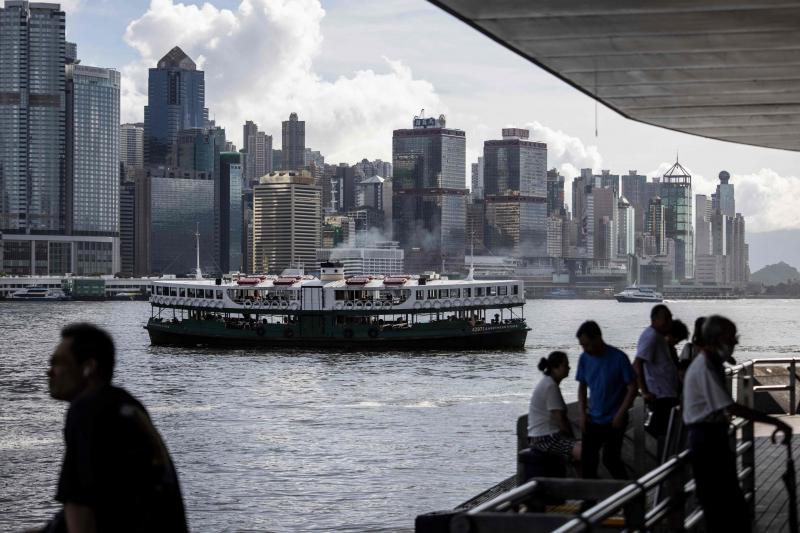Hong Kong’s economy grew faster than expected in the second quarter, pointing to some stability in key sectors despite challenges in real estate and retail.
GDP expanded 3.3 percent in the three months ended June from the prior year, according to advance estimates from the Census and Statistics Department yesterday. That’s higher than a median estimate of 2.7 percent and exceeded even the most bullish forecast among economists surveyed by Bloomberg News.
The data signals resilience in the region’s financial hub after several years of pressure from the COVID-19 pandemic and high borrowing costs. Increasing trade and capital flows from mainland China into the city have helped buoy growth so far this year.

Photo: Isaac Lawrence, AFP
The better-than-expected uptick may help the government achieve its full-year growth target of 2.5 percent to 3.5 percent. It followed strong first-quarter expansion that was revised up to 2.8 percent from 2.7 percent.
Exports grew at a double-digit pace for the last three straight months, driven by strong global demand. But the outlook remains challenged by the real estate sector downturn and a slowing economy in China, the city’s largest trading partner.
“The economy should continue to grow in the remainder of the year, but performance of the different economic segments may vary amid uncertainties on various fronts,” a government spokesperson said in a statement. The person cited geopolitical tensions, trade conflicts and US interest rate trajectory as potential headwinds.
Hong Kong’s economy is one of the slowest growing in the region. Analysts surveyed by Bloomberg expect growth will dip to a 2.7 percent pace this year from 3.3 percent last year, the only developed economy in Asia forecast to slow except Japan.
On a quarterly basis, GDP expanded 0.4 percent from the first quarter, according to the statement.
Goods exports and imports of services rose the most among GDP components from the prior year. Fixed capital formation, a category that includes the total value of investment spending, also increased at a faster pace.
Private consumption fell in the quarter for the first time since the third quarter of 2022. Spending has been restrained by a strong currency, pegged to the US dollar, and weaker sentiment. The government said the changes in spending habits of locals and tourists and the strong Hong Kong dollar “may continue to pose challenges.”
Real estate has been a particular sore spot, as demand remains weak with higher mortgage rates. Residential property prices have fallen to their lowest since 2016, increasing the risk of homebuyers finding themselves under water on loans. Office buildings are finding it difficult to attract tenants.
The dour mood and more frugal tourists have also kept a lid on retail spending, with sales falling for a third straight month in May, the longest streak since 2021. Many locals also spend across the border in Shenzhen and other mainland cities where goods and services tend to be cheaper.

Taiwan Semiconductor Manufacturing Co (TSMC, 台積電) secured a record 70.2 percent share of the global foundry business in the second quarter, up from 67.6 percent the previous quarter, and continued widening its lead over second-placed Samsung Electronics Co, TrendForce Corp (集邦科技) said on Monday. TSMC posted US$30.24 billion in sales in the April-to-June period, up 18.5 percent from the previous quarter, driven by major smartphone customers entering their ramp-up cycle and robust demand for artificial intelligence chips, laptops and PCs, which boosted wafer shipments and average selling prices, TrendForce said in a report. Samsung’s sales also grew in the second quarter, up

LIMITED IMPACT: Investor confidence was likely sustained by its relatively small exposure to the Chinese market, as only less advanced chips are made in Nanjing Taiwan Semiconductor Manufacturing Co (TSMC, 台積電) saw its stock price close steady yesterday in a sign that the loss of the validated end user (VEU) status for its Nanjing, China, fab should have a mild impact on the world’s biggest contract chipmaker financially and technologically. Media reports about the waiver loss sent TSMC down 1.29 percent during the early trading session yesterday, but the stock soon regained strength and ended at NT$1,160, unchanged from Tuesday. Investors’ confidence in TSMC was likely built on its relatively small exposure to the Chinese market, as Chinese customers contributed about 9 percent to TSMC’s revenue last

LOOPHOLES: The move is to end a break that was aiding foreign producers without any similar benefit for US manufacturers, the US Department of Commerce said US President Donald Trump’s administration would make it harder for Samsung Electronics Co and SK Hynix Inc to ship critical equipment to their chipmaking operations in China, dealing a potential blow to the companies’ production in the world’s largest semiconductor market. The US Department of Commerce in a notice published on Friday said that it was revoking waivers for Samsung and SK Hynix to use US technologies in their Chinese operations. The companies had been operating in China under regulations that allow them to import chipmaking equipment without applying for a new license each time. The move would revise what is known

UNCERTAINTY: A final ruling against the president’s tariffs would upend his trade deals and force the government to content with billions of dollars in refunds The legal fight over US President Donald Trump’s global tariffs is deepening after a federal appeals court ruled the levies were issued illegally under an emergency law, extending the chaos in global trade. A 7-4 decision by a panel of judges on Friday was a major setback for Trump, even as it gives both sides something to boast about. The majority upheld a May ruling by the Court of International Trade that the tariffs were illegal. However, the judges left the levies intact while the case proceeds, as Trump had requested, and suggested that any injunction could potentially be narrowed to apply